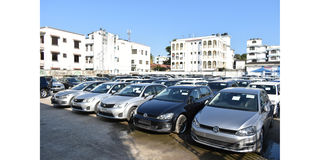Car bazaars, the economic lifeline for Mombasa island

Second-hand motor vehicles at Eyre Motors yard in Mombasa County on July 5, 2021. The County has seen a rise of car yards and bazaars .
Now that most shipping and logistics companies have moved their operations to Nairobi and Naivasha, used-car dealerships have become the economic lifeline of the island port city of Mombasa.
With a depressed tourist market due to the Covid-19 pandemic, businesses such as curio shops and residential buildings have had to give way to the rapidly growing second-hand motor vehicle industry.
Few tourists are visiting and logistics companies have moved elsewhere with the advent of the Standard Gauge Railway, leaving many spaces empty, said Car Importers Association chairman Peter Otieno.
“Mombasa island, largely viewed as a tourism city, is currently undergoing major changes, with most buildings and open spaces turning into car bazaars,” he said “Selling second-hand motor vehicles is the only business that is keeping the island afloat due to the sinking economy.”
Many residential houses are being demolished to pave the way for car showrooms and yards, now numbering more than 200, especially on Haile Selassie, Nyerere, Mbaraki, Moi, Jomo Kenyatta, Lumumba and Archbishop Macarios avenues.
High-end residential estates like Kizingo and Ganjoni have not been spared by this new phenomenon either.
Many shoppers from upcountry, Mr Otieno said, prefer to buy cars from Mombasa because it has many showrooms with a wide variety of vehicles and the cost is lower.
“Some costs are eliminated when you buy a car from Mombasa. People believe that because of the competition among the many showrooms, some good bargains can be had,” he said.
Proximity to the port is another reason for the mushrooming of showrooms and car yards in Mombasa.
“In Ganjoni, people who used to live there have moved to Nyali, Kizingo, Mtwapa and Bamburi. Their houses are idle and landlords who depended on rental income have opted to change their houses into showrooms,” Mr Otieno said.

Second-hand motor vehicles at a yard in Mombasa County on July 5, 2021. The County has seen a rise of car yards and bazaars.
Most of the offices on Moi Avenue that used to house logistics companies are now vacant.
In early 2019, Mombasa County Governor Hassan Joho threatened to rid the city of car showrooms, saying they were “damaging the face of the city”.
The county announced that it was implementing its Vision 2035 programme, which defined each area and the kind of business to be offered there.
Car showroom owners were asked to move their businesses from the city centre to Miritini, something they vehemently opposed.
They sued to block the proposal. In March this year, the High Court in Mombasa barred county officials from relocating car dealers from the city centre, saying the business people were not consulted.
The motor vehicle industry is said to support at least 300,000 people in Mombasa, from security guards, labourers and cleaners to brokers.
“There are at least 200 showrooms, each employing at least 10 people. Brokers, security guards, spare shops, garages, petrol stations, car washes, banks are all benefiting from this industry,” Mr Otieno said.
“Hotels and lodgings are also reaping big from the used-motor vehicle industry as clients come to sleep and dine there. This sector is holding the economy of Mombasa.”
Car dealerships provide a market for car decor and accessories and suppliers through the purchase of new vehicle essentials like tinting, riveting and first aid kits, said Mobilecore Autoshop Accessories owner Dorcas Rottok.
“The business entails direct engagement with owners of the showrooms for business referrals. We have entered into a business partnership with some,” she said.
“I have operated for the past year. Recently I began importing directly from China and now I offer both retail and wholesale items to my clients.”
Magari Capital founder and CEO Dilum Rathnayaka acknowledged that the motor vehicle industry in Kenya is evolving towards newer and later-model cars, unlike previously when many old vehicles were imported.
He noted that most of his clients prefer European makes over conventional Japanese models because of the options available and the looks of the vehicles.
“Furthermore, banks have evolved in providing asset financing swiftly and moved out of traditional lending,” he told the Nation.
“For this reason, people patronise banks more and more and do obtain in-house hire purchase financing and sacco financing, which is very costly.”





